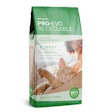
"From the 8 billion pounds of kitty litter heading to landfills each year to the effects of a pet’s carnivorous diet, pet parents should be aware of the substantial carbon footprint left by pets," proclaims the online article, "10 Simple Steps to Reduce Your Pet’s Carbon Pawprint." Books like Pets and the Planet: A Practical Guide to Sustainable Pet Care, Eco Dog: Healthy Living for Your Pet and Green Dog, Good Dog are widely available to the eco-concious consumer, promising to guide them to the "greenest" petfoods and treats. Petco recently announced its partnership with Greenwala.com, the self-proclaimed online resource empowering consumers to go "green."
What does all this mean? According to research conducted by Mintel, both packaging and product concerns are the drivers motivating consumers to buy sustainable, eco-friendly, "green" and fair trade petfood products. Mintel defines "green" claims in categories such as fair trade, all natural, local and reduced carbon footprint for products and ingredients and recyclable, biodegradable and reduced/ minimal for packaging.When asking consumers why they purchased a food making "green" claims, they responded:
- 67% wanted to create less waste;
- 65% said they wanted to support brands that are helping the environment;
- 45% thought such claims denoted that the product was of a higher quality than other products; and
- 42% said they were concerned about food safety.
Mintel also found consumers age 18-34 were much more likely to be driven to purchase products due to these claims -- calling the bracket of 25-34 year olds the "sweet spot" for sustainable purchasing.
When Mintel asked consumers to think about "green" products in general and asked them what motivated them to buy certain products, they found packaging counts more than labeling or special certifications. Fifty percent of consumers said a package that has sustainable attributes motivates them to make a purchase while only 26% of consumers are motivated by a logo or seal from a third party that they recognize on the label.
Companies like Barkwheats try to steer environmentally conscious consumers in the direction of their dog biscuits by not only using 100% recyclable, biodegradable and compostable packaging but also claim to be the first pet product company to ever carry the fair trade certified mark.
Brands like NuHemp Fetch-erz Ballz entice the sustainably-savvy with their ingredients -- hemp is not only great for a dog's digestion, it can also grow extremely fast in virtually any climate with no herbicide, fungicide or pesticide, the company says. The box the Ballz are packaged in? Made from 100% post-use recycled fibers, naturally.
Mintel says the five most important things to remember about sustainability and the consumer persepective of your products are:
- Packaging efforts seems to have the broadest-based appeal and greatest impact on the shelf.
- A clear quality and safety message remains as important as eco-friendliness when it comes to petsumers' purchasing decisions.
- Simple, bold claims are critical to attracting non-"green" consumers and reinforcing messages with already-converted consumers.
- The most successful sustainable products require little to no change to the consumer's usual routine.
- The economy has had little impact on consumers' attitudes towards green spending, but they still remain reluctant to spend more for "green" benefits, so price can never be ignored.

.jpg?auto=format%2Ccompress&fit=crop&h=167&q=70&w=250)











